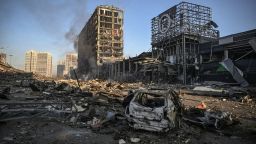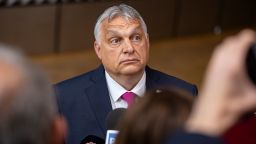Editor’s Note: Frida Ghitis, (@fridaghitis) a former CNN producer and correspondent, is a world affairs columnist. She is a weekly opinion contributor to CNN, a contributing columnist to The Washington Post and a columnist for World Politics Review. The views expressed in this commentary are her own. View more opinion on CNN.
The worst of the pandemic may be over, but the economic aftershocks of the global crisis, made much worse by Russia’s war against Ukraine, mean that a return to normalcy is nowhere in sight.
“The hurricane is right out there down the road coming our way,” said JPMorgan Chase CEO Jamie Dimon on Wednesday, adding a warning to his ominous economic forecast. “We just don’t know if it’s a minor one or Superstorm Sandy. You better brace yourself.”
For the developed world, the prospect of a severe recession is deeply worrisome. In poorer countries, the growing fear – and already present danger – is what the World Food Program is calling a looming “hunger catastrophe.”
When economies shrink and poverty rates increase, political systems shudder. And we’re already seeing that in some countries.
As we emerge from the pandemic’s grip, we’re beginning to see just how the coronavirus reshaped the world. That picture was troubling enough before Russia threw a punch that pushed the world backwards.
The pandemic crimped supply chains as businesses cut down or stopped production altogether. Shipping and logistics were ensnared, pushing prices even higher. Shifting ideas about work prompted millions of people to quit their jobs, many of them refusing to accept positions they might have taken before the crisis, and severely disrupting labor markets. Governments pumped cash to keep people afloat, fueling inflation that is now forcing central bankers to raise interest rates and take other painful measures.
Dimon was speaking about the US economy, referring to the impact of the Federal Reserve’s efforts to smother soaring inflation. But the economic reverberations of the twin crises – the pandemic and the Ukraine war – are sending shockwaves across the entire planet.
While some in the US are quick to blame the current administration for the country’s woes, the fact is that almost every symptom afflicting America’s economy is also besetting much of the world. Gas prices are skyrocketing across the globe, and so are food prices. Staff shortages have become the bane of business owners. “Help Wanted” signs are posted across Amsterdam, Bruges, and countless other cities, with some businesses slashing their hours of operation for lack of workers. Inadequate staffing is also causing endless lines at airports across Europe, just as it is contributing to flight cancellations in the US.
Gas prices were already climbing before Russian President Vladimir Putin launched the Ukraine invasion. That’s because during the pandemic, when gas dropped below $2 a gallon in the US, producers and refiners slashed output by almost 40%. Some refineries even closed permanently. When the economy started recovering, they were slow to ramp up to previous levels.
Then Russia, a major oil producer, invaded Ukraine, and oil prices soared even higher. Production in the US has increased, but not enough.
Food prices and hunger were already at crisis levels around the world before the Ukraine war, with an ongoing fertilizer shortage – also worsened by Russia’s war – exacerbating production issues. A July 2021 study by Oxfam found a sixfold increase in the number of people living in famine-like conditions compared to 2020, with more people dying from malnutrition than Covid. The situation has deteriorated since Russian forces turned some of Ukraine’s agricultural land into war zones, and then blockaded key Ukrainian ports such as Odesa and stole Ukrainian grain, depriving global markets of a major source of basic foods.
The political impact is already striking. In Colombia, where the pandemic decimated the middle class and sent millions into poverty, the first round of presidential elections last week produced a shocking result. After decades of electing centrist or center-right presidents, Colombian voters set the table for a runoff on June 19 between a former leftist guerrilla, Sen. Gustavo Petro, who promises profound change, and Rodolfo Hernández, a largely unknown 77-year-old businessman and former mayor that some describe as a Colombian version of former US President Donald Trump, with misogynistic views and a penchant for controversy.
With most Colombians experiencing food insecurity and 40% living in poverty, voters chose two anti-establishment figures, arguably the reaction of a population traumatized by economic headwinds and worsening inequality.
When people experience extreme economic pain, they often demand change. And it looks like change is coming. Colombians are on edge.
Similar dramas are playing out across the globe. Each country is different, and every situation includes multiple factors. But what is undeniable is that the impact of the coronavirus pandemic is lingering in ways much more significant than our exhausted debates over whether or not to wear masks or gather indoors with friends.
In Sri Lanka, for example, bad decisions before the pandemic left the country deeply in debt. Then the pandemic clipped the lifeline of tourism. The coup de grace came as Russia’s war fueled even higher prices. The country ran out of money, defaulted on its debts and now cannot afford food or medicine. It’s a crisis unlike any the country has experienced. Amid massive protests, the Prime Minister has resigned, his house burned down, and calls for the President to step down continue.
Widespread economic turmoil is frequently a trigger for political instability. Look at the so-called Arab Spring that shook the Middle East a decade ago, toppling regimes and launching civil wars. Rising food prices and unemployment were among the key triggers. Rising prices could again foment political instability in the Middle East.
The pandemic has dealt a massive blow to the world beyond the millions of lives it has already taken. And then, just when the world was trying to ease supply chain bottlenecks, stabilize labor markets and restore oil production to pre-pandemic levels, Putin’s war reversed much of the progress.
Of all the emergencies, the most urgent is the “seismic hunger crisis” that WFP says is already “enveloping the world” and could drive 48.9 million people to the edge of famine. That’s many times more than the nearly 6.3 million people confirmed to have died of Covid so far.
To prevent such a catastrophe, world powers should consider ways to break Russia’s blockade of Ukrainian ports. Putin is attempting to weaponize starvation, cynically suggesting he would help ease global hunger if the West lifts sanctions against Russia. The sanctions, it’s worth remembering, were triggered by Russian aggression.
Europe should also work to boost Ukrainian exports by rail, even if that would not make up for seaborne routes.
Get our free weekly newsletter
Lower income countries, in the meantime, need urgent support. Since the war, grain prices have shot up, and financial support for purchases is an obvious answer. Efforts by the World Food Program to supply food to the poor demand increased international backing.
As we learned in recent years, the problems in one country don’t stay within its borders. Humanitarian reasons alone justify assistance to prevent famine, but self-interest is also at play.
Poverty and hunger drive great migrations and produce political instability. And that, in the face of an approaching economic hurricane, could make an already-difficult situation even more perilous.







